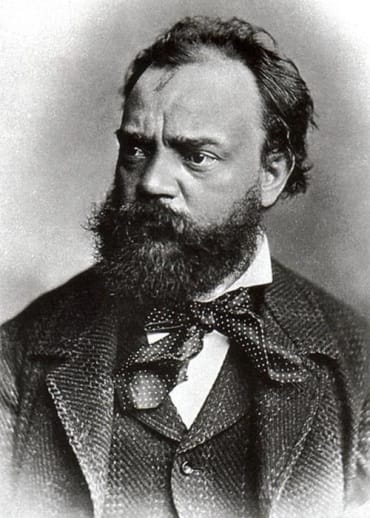Antonín Dvořák was born in Nelahozeves on September 8. 1841. His father was a musician and abandoned the family business - a guest-house with butchery - to earn his living as a zither player. At the age of six, young Antonín had his first violin lessons, with 12 years he also learned to play piano and organ. After he graduated from the organ school in Prague, Dvořák did not find a job as organist, but played the viola in Karl Komzak's private orchestra and gave piano lessons. At this time he already coposed music but did not make it public.
It was the beginning of the 1870's when Dvořák dared to go public with his music and quit his orchestral post to have more time for writingmusic. The patriotic hymn "The Heirs of the White Mountain" for choir and orchestra was his national breakthrough. And Johannes Brahms finally gave Dvořák his international break when convincing his publisher Fritz Simrock to publish Dvořáks duets, which later became famous as "Slavonic Dances".
Dvořák traveled to Moscow, St. Petersburg and several times to London. In 1890, he became professor at the Prague Conservatory. Only two years later, he went to New York as the Director of the National Conservatory of Music. He studied spirituals of the black plantation workers and Indian melodies. We find elements of this music in his famous Symphony No. 9 "From The New World", combined with music from the immigrants' native countries.
In 1895, Dvořák came back to Prague and dedicated his musical work mainly to symphonic poems. In his last years, beginning from 1898, he composed mainly operas.
On May 1, 1904 Antonín Dvořák died from a stroke within the family circle. Thousands of people accompanied the funeral procession.
Dvořák's music stands out due to elements of folk music. Mainly between 1876 and 1891 his works were characterized by Czech folk music and significantly contributed to Czech musical identity.
